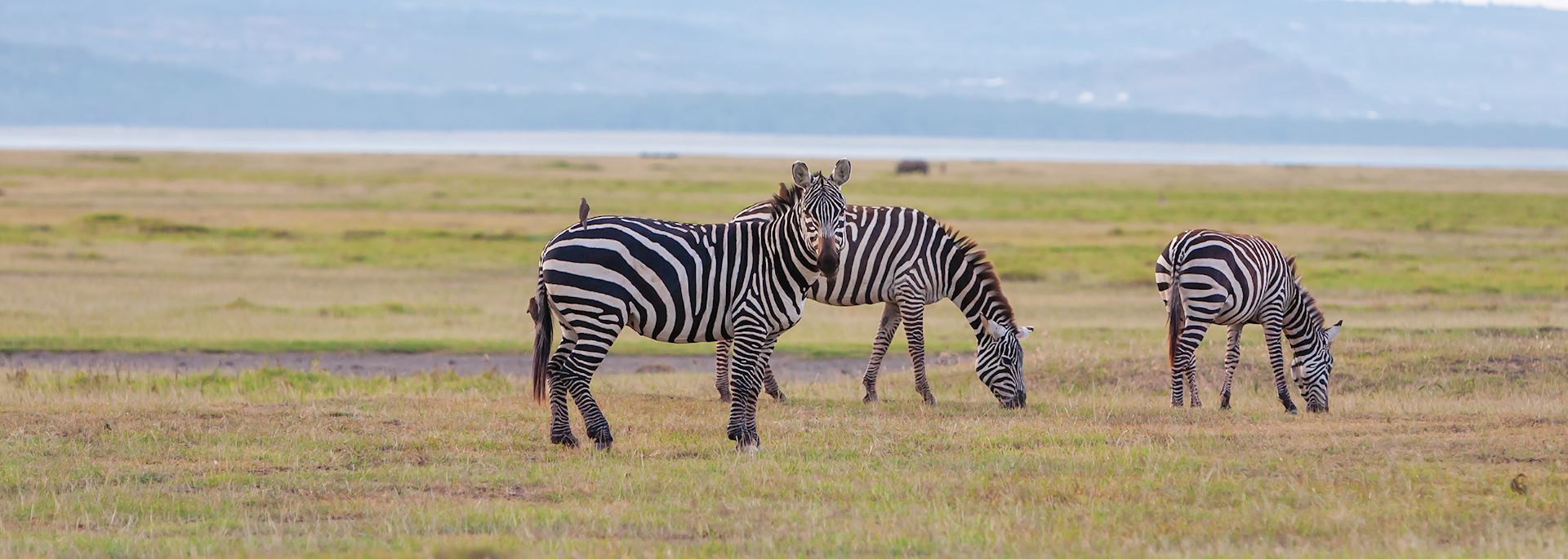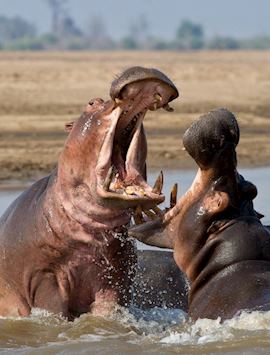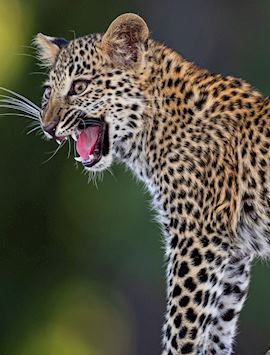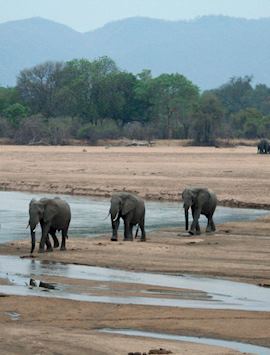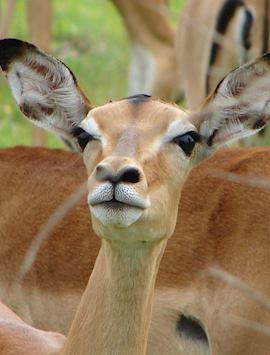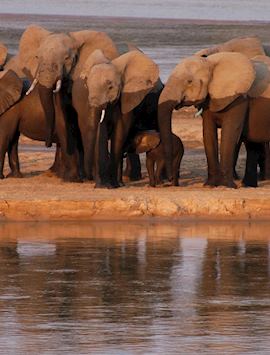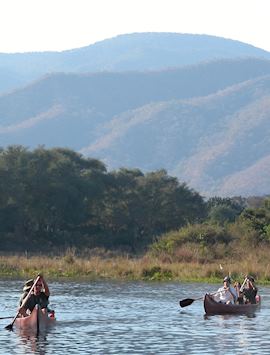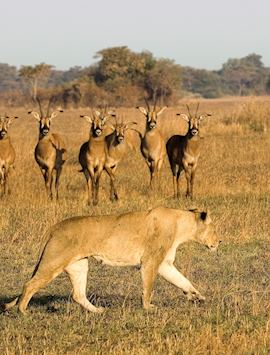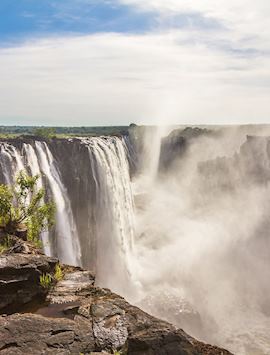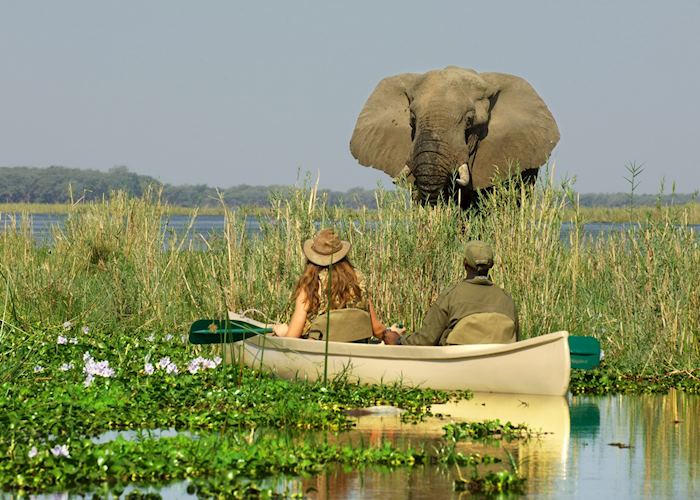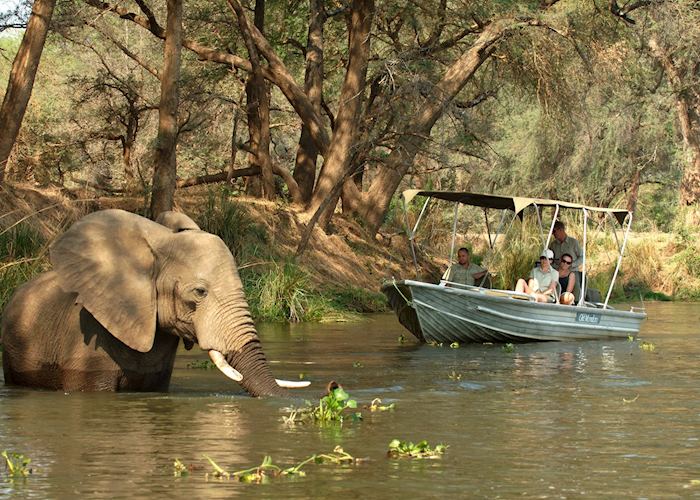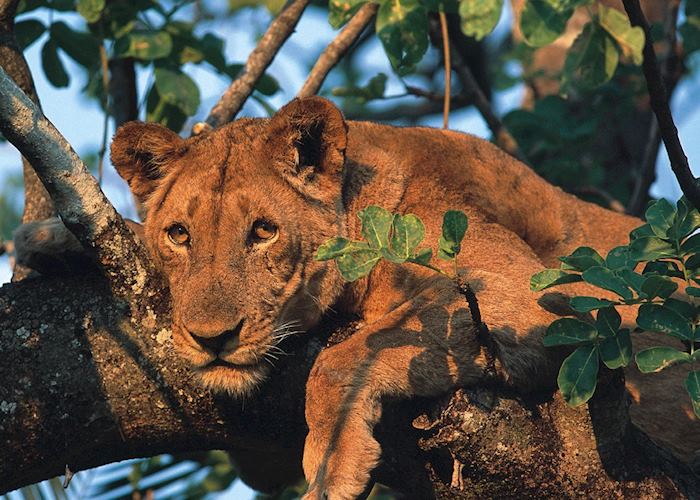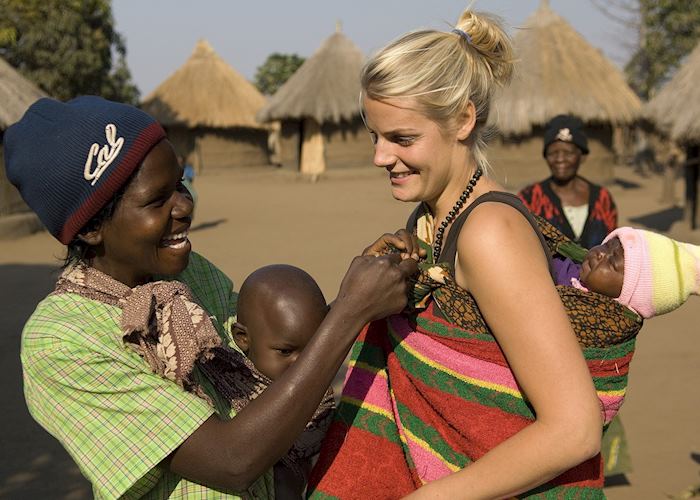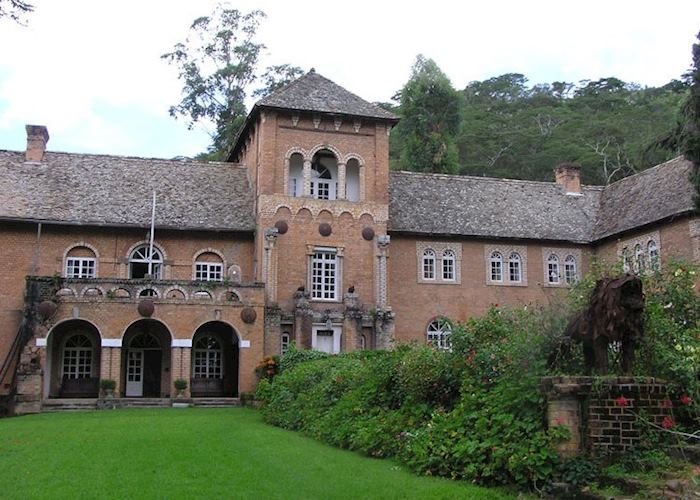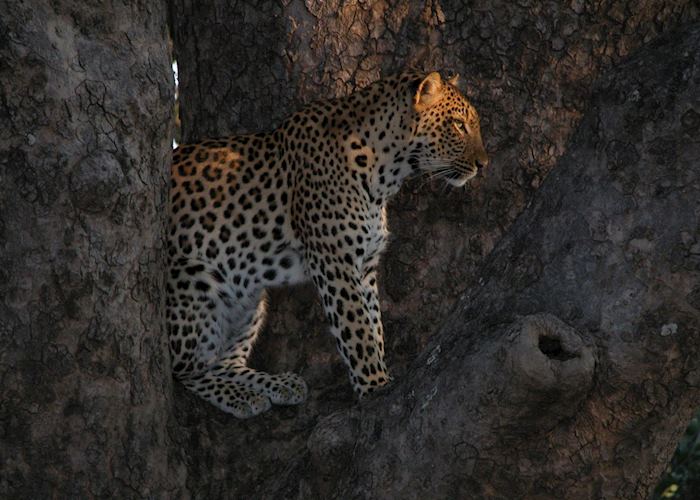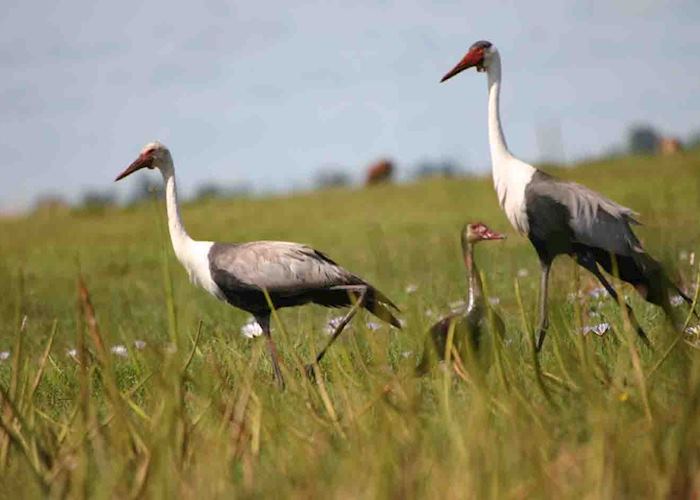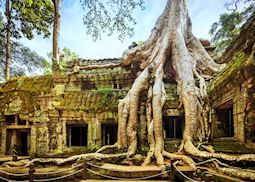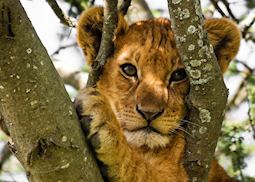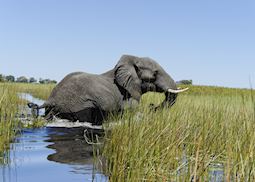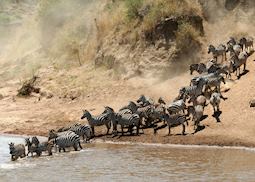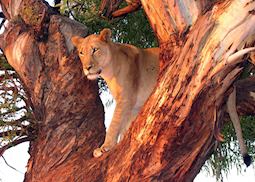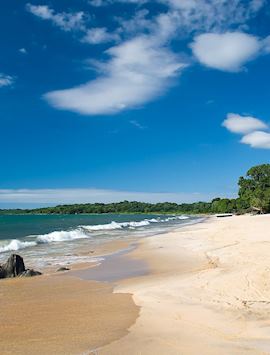
The wild heart of Africa, Zambia is a green oasis of national parks fed by rivers and wetlands that attract a huge variety of animals. Elephant, lion, wild dog and hyena are commonly spotted, and leopard cool off from the sun on the shady branches of trees. Before or after your safari in Zambia you can visit Victoria Falls, half of which lies within the country’s boundaries. Our specialists will use their own safari experiences in Zambia to plan your holiday, whether you want to focus on searching for the Big Five or look for more unusual wildlife.
Added to its game drives, Zambia is known as the home of the walking safari, and its guides are among the highest qualified in Africa. They’ll show you how to track animals, identify birds from their calls and discover the hidden world of insects as you walk through the bush.
Suggested tours for Zambia
These tours give you a starting point for what your holiday to Zambia could entail. Treat them as inspiration, as each trip is created uniquely for you.
Suggested activities for Zambia
Whatever your interests, our specialists will build activities into your trip that connect to how you want to experience Zambia.
-
Livingstone Island Excursion 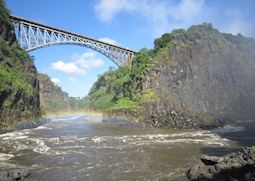
Livingstone Island Excursion
Victoria FallsLivingstone Island Excursion
You are taken by boat to the island on the edge of Victoria Falls and taken on a brief history tour before swimming across a channel, crossing a rocky outcrop and jumping into a rock pool.
View details -
Sunset Cruise on the Zambezi 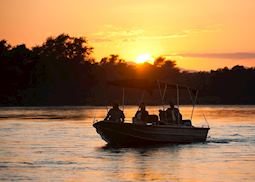
Sunset Cruise on the Zambezi
Victoria FallsSunset Cruise on the Zambezi
The cruises are shaded and gently make their way upstream toward the National Park, usually accompanied by a brief talk about the river and its wildlife by your skipper.
View details -
Victoria Falls Helicopter Flight 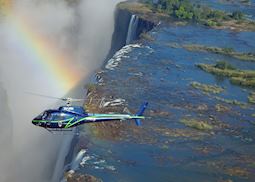
Victoria Falls Helicopter Flight
Victoria FallsVictoria Falls Helicopter Flight
Flying lower than a conventional aircraft, you will fly a complete circuit over the Falls in both directions, giving you spectacular views of the Falls.
View details
More choice for your safari
- Inspiration across all our African destinations
- Trip suggestions based on your interests
- Advice on where to safari, when
- Meet our team of safari experts
Best time to visit
Our specialists advise on the best months to visit Zambia, including information about climate, events and festivals.
Request our brochure
Covering all seven continents, The World Your Way shows you how you can see the world with us. It features trip ideas from our specialists alongside hand-picked stays and experiences, and introduces our approach to creating meaningful travel experiences.
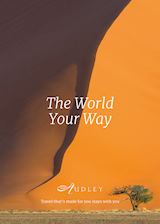
Useful information for planning your holiday in Zambia
The official language of Zambia is English, although more than 72 different languages and dialects are spoken in the country.
The currency of Zambia is the Zambian kwacha (Zw). US dollars are also widely accepted. You’ll find ATMs at the international airports and in larger cities. Major credit cards, such as Visa and MasterCard are accepted at larger hotels, shops and restaurants, but American Express is not. A surcharge of approximately 5% is common when paying by card.
When in Zambia you should try ifisashi (a mix of ground peanuts, tomatoes, onions, and green vegetables), chikanda (a vegetarian loaf), or michopo (roasted meat). You’ll find nshima (a maize, millet, or cassava porridge rolled into balls and eaten with stew) almost everywhere, and near the lakes, kapenta (a small sardine-like fish) and buka buka (Nile perch) dishes are popular.
If you’re feeling braver, ifinkubala (fried caterpillars) are considered a local delicacy. In mid afternoon, vitumbuwa (sweet fritters) are the traditional snack, while Mosi, the local beer, and munkoyo, a non-alcoholic drink made from fermented maize meal, are the most popular drinks.
Tipping 10% in a more upmarket restaurant in Zambia is standard, though it’s not expected at local food stalls. On safari, you should tip your guide at the end of your stay, and there’s usually a communal tipping box to give a tip to camp or lodge staff.
For the latest travel advice for Zambia, including entry requirements, health information, and the safety and security situation, please refer to the Foreign, Commonwealth & Development Office website.
In Zambia you can get close to nature on walking safaris in quiet parks, take tranquil boats trips on the Zambezi, and experience the sheer power and force of nature at Victoria Falls. A highlight of a trip is visiting quieter parks where wildlife sightings are often yours to enjoy alone.
Walking safaris were pioneered here and these are led by expert guides, giving you a whole new perspective on life in the bush. You can also take traditional 4x4 safaris, night drives, and boat trips to see hippo and crocodiles lurking in the waters, while lion, cheetah, buffalo, and elephant roam the plains.
Zambia is also home to one half of Victoria Falls. You can take a helicopter ride over the thundering falls, jump into a rock pool, or take a sunset cruise on the Zambezi to spot wildlife as you sip a cocktail on board.
In Zambia you can stay in intimate bush camps, luxurious safari lodges, and riverside hotels where you’ll wake to the sound of hippo grunting in the water and the rumbling calls of elephant. Most lodges and camps overlook waterholes or rivers where wildlife can wander past your room at any time of day.
While on safari, you could choose to stay in tented rooms in the heart of the bush, opt for a private, lodge-style retreat, or enjoy an unusual stay in characterful treehouse chalets. You’ll also find a great choice of places to stay at Victoria Falls including an indulgent river lodge overlooking the Zambezi and grand landmark hotels. Or, head to a private estate in the Great Rift Valley to stay in a historic manor house. To get some ideas, browse our collection of places to stay in Zambia.
In Zambia most visitors go to North and South Luangwa national parks, Kafue National Park, and Lower Zambezi National Park. These are the main wildlife areas and offer the best chance of spotting a wide variety of animals.
Each park has its own character and visiting more than one region gives an excellent overview of what Zambia has to offer. Herds of elephant and buffalo as well as basking crocodiles and hippo can be seen in South Luangwa National Park, impala, waterbuck, and zebra are preyed on by lion, leopard, and wild dog in Lower Zambezi National Park, while off-the-beaten-track Kafue National Park promises exploration and discovery in a region that’s little visited by others.
After time spent on safari, you could finish your trip with a visit to Victoria Falls to relax in a riverside hotel while you explore the Zambezi River by boat and visit this natural wonder.
You’re likely to see lion, elephant, zebra, hippo, and warthogs, and have a possibility of encountering leopard, wild dog, and spotted hyena, on safari in Zambia. The diversity of wildlife in Zambia’s national parks is highly impressive and large predators roam the plains in search of grazing cape buffalo, bushbuck, lechwe and kudu, while hippo wallow in rivers, and baboons and vervet monkeys chatter in the trees.
Herds of elephant congregate at waterholes and ramble through the bush, and if you’re lucky, you’ll get to see spotted hyena and packs of wild dog. In South Luangwa National Park, the large lion prides are a highlight, and elusive leopard are regularly spotted. Zambia’s wilderness areas are also home to more than 700 bird species, many of which are rare or endemic.
It takes around 13 hours to fly from the UK to Zambia.
The time zone in Zambia is UTC+2 hours. Daylight Savings Time is not observed in Zambia.
Flying between parks is the best way of getting around Zambia as the distances are large and the roads poor.
Your doctor can provide you with vaccine advice for Zambia, but you should also ensure you’re up to date with the recommended vaccinations for your home country. You can also check the suggested vaccinations on the Travel Health Pro website.
If you’ve been to (even if just in transit) a country with yellow fever in the 30 days prior to your arrival in Zambia, you’ll need a yellow fever vaccination certificate or exemption certificate. Speak to your doctor before booking your trip as yellow fever vaccination is not always advised if you’re over 60.
Malaria is a risk throughout Zambia. Please see your doctor for advice about which antimalarial medication you should take.
Your best defence against malaria is to avoid mosquito bites. Wear loose, long-sleeved clothing, long legs, or skirts, and put an insect repellent with 50% DEET on exposed skin. If your room is not screened use the mosquito net provided, and if you begin to feel unwell and develop a high fever or other symptoms either during or after you return home, seek prompt medical advice, and make sure to mention your travel history.
Check that your passport is valid for at least six months from the date of your arrival in Zambia and has two consecutive blank pages.
Zambia in pictures
Our expert guides to travelling in Zambia
Written by our specialists from the viewpoint of their own travels, these guides will help you decide on the shape of your own trip to Zambia. Aiming to inspire and inform, we share our recommendations for how to appreciate Zambia at its best.
-
Luxury safaris in Zambia 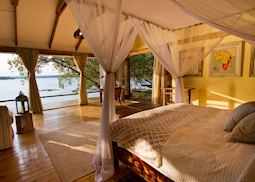
Luxury safaris in Zambia
Luxury safaris in Zambia
Zambia's spectacular national parks, abundant wildlife and luxury lodges offer both first time and return visitors an unrivalled safari experience. Audley's Southern Africa safari specialist Russell explains how to make the most of your time.
Read this guide -
Family safaris in Zambia 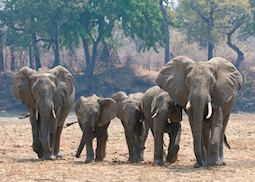
Family safaris in Zambia
Family safaris in Zambia
If you are considering taking your family on safari, Zambia has a lot to offer every member of your tribe. Many camps have private houses with space for little legs to tire themselves out, flexible dining options and child-minding facilities.
Read this guide -
Green Season in Zambia 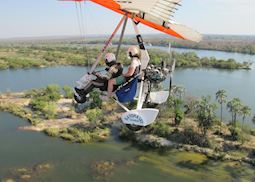
Green Season in Zambia
Green Season in Zambia
The Green Season in Zambia takes place in the Luangwa Valley between November and May. A more cost-effective time to travel, it's during this period you'll see newborn animals in abundance and a landscape awash with colour thanks to the heavy rains that descend.
Read this guide -
Walking safaris in Zambia 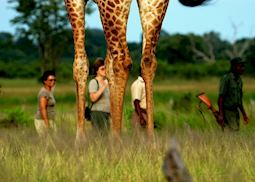
Walking safaris in Zambia
Walking safaris in Zambia
A walking safari in Zambia allows you the opportunity to tread the same dusty plains as the animals Africa is so well-known for. Here, you can observe game from a different perspective under the watchful eye of first-class guides, in a variety of different national parks.
Read this guide -
Visiting Victoria Falls 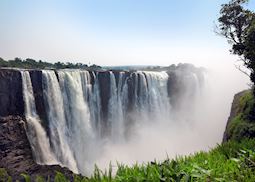
Visiting Victoria Falls
Visiting Victoria Falls
A visit to Victoria Falls can be incorporated into a tailor-made trip to Zambia. A true spectacle that enchanted David Livingstone, this natural wonder is one such highlight that our country specialists will not want you to miss when exploring this breathtaking country.
Read this guide -
See the bat migration in Zambia 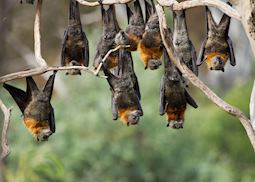
See the bat migration in Zambia
See the bat migration in Zambia
The bat migration takes place in Zambia between October and December in Kasanka National Park, and is the world's largest mammal migration. If you would like to see the bat migration you can include it in a bigger safari itinerary thanks to the park's proximity to the Luangwa Valley.
Read this guide -
Honeymoons in Zambia 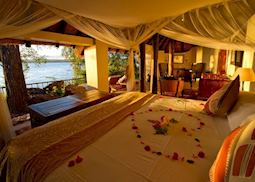
Honeymoons in Zambia
Honeymoons in Zambia
Zambia is home to a wonderful selection of lodges that offer fantastic game viewing and relaxation in equal measure. If you would like to plan your honeymoon in Zambia, our specialists can tailor a trip to your preferences and help you build the honeymoon of a lifetime.
Read this guide -
A typical day on an African safari 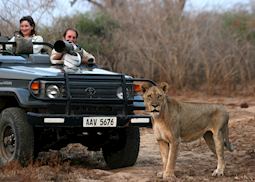
A typical day on an African safari
A typical day on an African safari
A typical day on safari essentially revolves around the need to see the wildlife at its most active. It usually follows a similar routine with slight variations between destinations and seasons.
Read this guide

